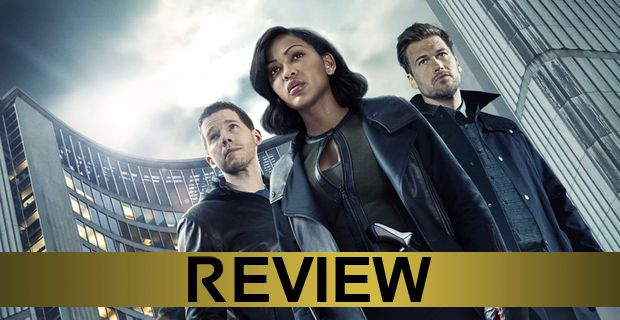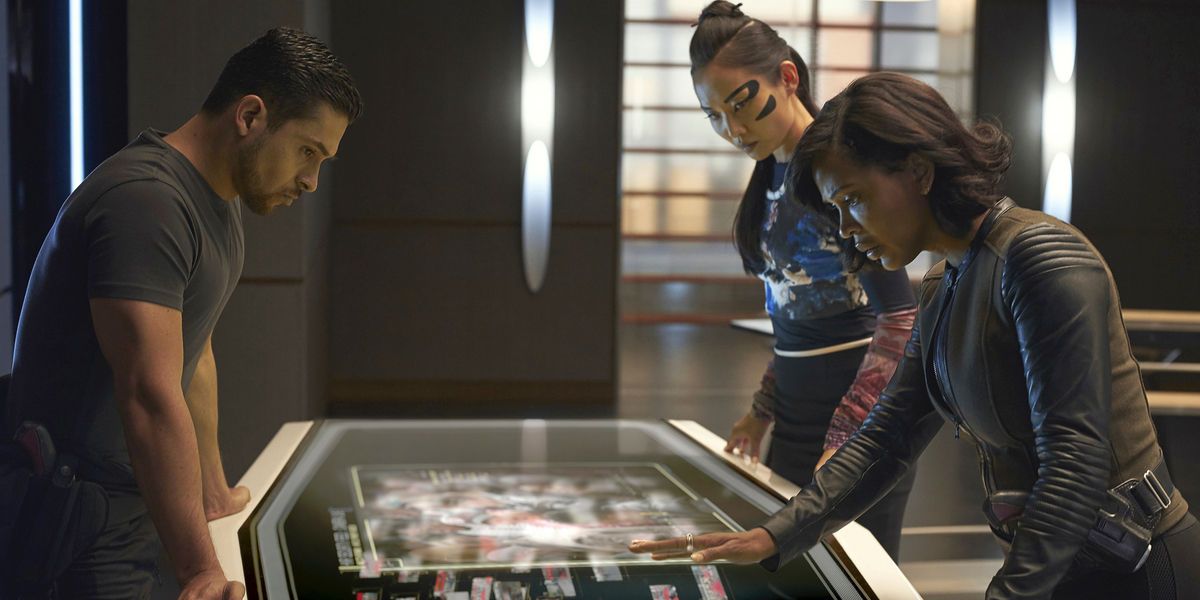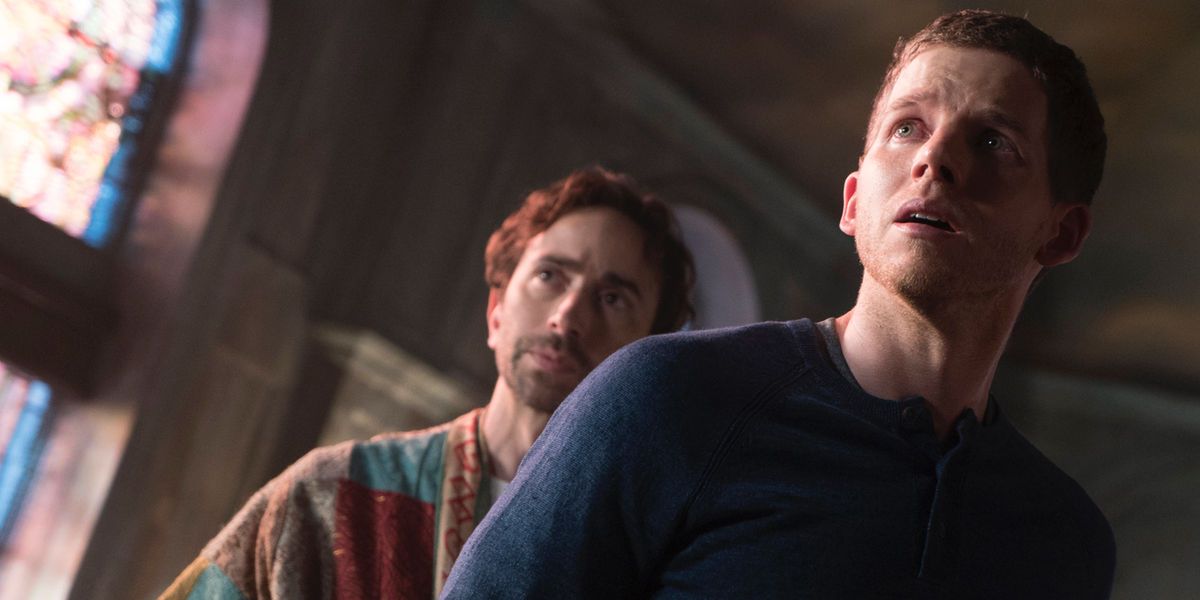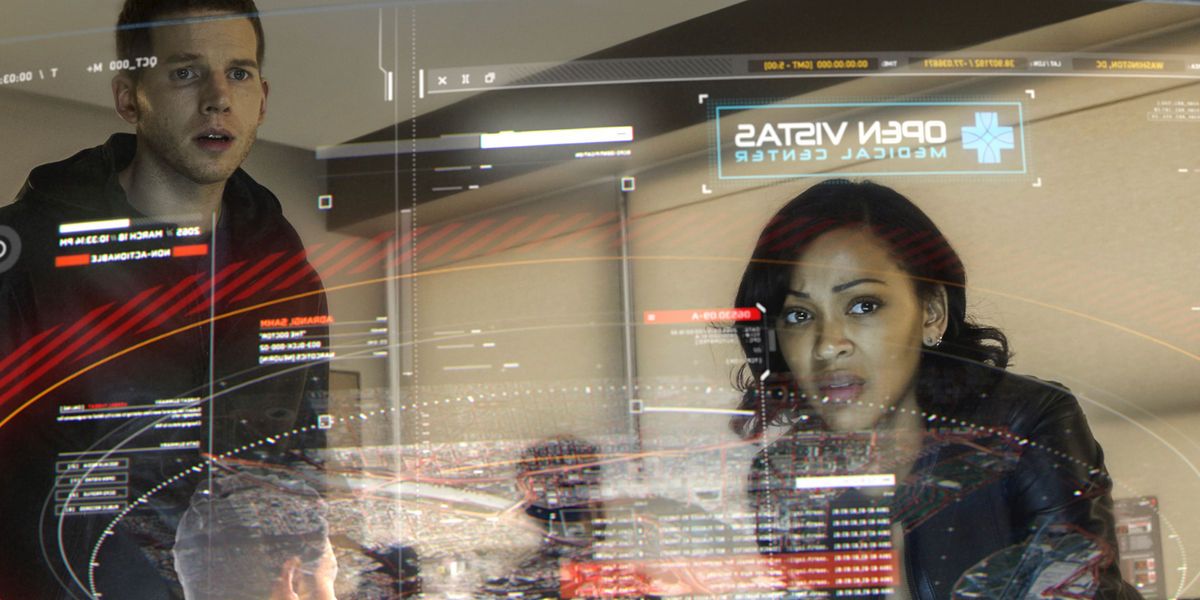[This is a review of Minority Report season 1, episode 1. There will be SPOILERS.]
-
It isn't that FOX's television adaption of Minority Report is bad television. It is slickly produced with an attractive cast headed up by Meagan Good (Anchorman 2) and Stark Sands (Inside Llewyn Davis) – with the underappreciated Wilmer Valderrama appearing in a mildly antagonistic supporting role. The effects are sometimes a highlight and sometimes a detriment – the high-tech motion-controlled computer devices look nearly as convincing (and sometimes silly to use) as they did in the film, while the futuristic cityscapes often appear most impressive when seen in the dark and out of focus. No, it's not that this adaptation of an adaptation is poorly made; it's that from top to bottom it comes across as completely uninspired.
To its credit, the series doesn't attempt to reimagine the world as seen by Philip K. Dick and Steven Spielberg, to shrink it down and make it work within the rapidly expanding confines of television. With the scope of what television is capable of increasing with every passing year, the idea that things must get smaller in order to work within the medium becomes more and more antiquated. And so, the series attempts to pick up where the Tom Cruise-starring film left off, reintegrating the audience to a futuristic Washington, D.C. where Precrime once existed to make homicide investigations a preventative measure rather than a search for answers.
Minority Report begins with a short prologue, explaining the events of the movie, while glossing over certain details, like Chief John Anderton and Director Lamar Burgess. With those particulars out of the way, the series is free to focus on the PreCogs – Agatha (Laura Regan), Arthur (Nick Zano), and Dash (the aforementioned Stark Sands) – and their attempt to live with the burden of their psychic abilities in different ways. Agatha remains mostly reclusive, while Arthur has parlayed his talent into a not unimpressive amount of wealth. Dash meanwhile, just wants to prevent the murders he sees in his head and seeks out Good's ambitious homicide detective Lara Vega in order to do so.
On paper, the idea definitely works; it's a basic procedural but with a twist and the benefit of piggybacking off a preexisting and successful IP. It also doesn't require any real commitment by the audience. As a procedural, viewers can check in randomly. Sure, they might miss out on some of the larger story elements the series is trying to set up, but those pieces can easily be gleaned from one episode to the next. It's a simple, straightforward, crime-of-the-week show that happens to have the same name as a successful Steven Spielberg-Tom Cruise joint.
But that's also where the series slips up: Minority Report had a point to it; it was about something. This series – at least here in the pilot – isn't interested in the social aspects of the government keeping tabs on its citizens and arresting and incarcerating them before they've committed a crime. Instead, it acts as police wish fulfillment, running with the idea of "what if we could catch the bad guys before they did anything wrong?" and painting it as an opportunity too good not to be capitalized on.
That forces the show to walk a specific tightrope; one where the villain each week either succeeds in killing someone and is stopped before he or she can do it again, or as they are in the first episode: caught in the act, red-handed, controlling a flock of killer pigeons with a Nintendo Power Glove. It's the notion of predictability made predictable. With that being the show's primary goal, the producers might have been better off adapting Early Addition and giving the predictive newspaper that visits Kyle Chandler a series of talking ads hawking edibles.
Tonally speaking, the show at least doesn't take itself too seriously. Good and Sands have an interesting, if not wholly convincing, buddy-cop vibe that develops a bit too quickly, but in the interest of time isn't the worst offense a new series (or even just this one) can make. Minority Report features far more reaching attempts at laughs than one might have expected. Predicting the exact spot pigeon droppings will land is certainly a useful skill for those living in urban areas, and while it affords the show an easy laugh, it may also be a tool in understanding the identity this series is presenting to its audience.
Most cop shows revel in the aftermath of a crime. They indulge in the brief glimpses of violence connecting the sometimes-ingenious how of it all to the irrepressibly human why, in a web of procedural sameness that is made different only by the conceit (e.g., PreCogs on the loose, world renowned master of deduction and his partner, or even grumpy future cop and his cheeky robot partner) and the chemistry shared by its leads. Minority Report absolutely is those shows deep down in its DNA, but its most interesting difference is also the one the series explores only on a superficial level.
This show is, ostensibly, a crime show fixated on preventing the crime from happening. It is essentially a show whose driving force is the desire to make sure it doesn't have a story to tell. And from that comes its story. That sounds like it would be fascinating, and it might be, if the series was interested in exploring that facet of itself in any way.
The main problem with the show's conceit is that, at the end of the day, Minority Report the film and the Philip K. Dick story were about issues of privacy and freedom. They were less concerned with the wish fulfillment of solving crimes before they happened – that was an aberration that made the narrative unique – than they were in commenting on the state of the world. That film espoused pressing post-9/11 concerns, and in this post-Snowden, post-Wikileaks world we live in, it's surprising and a little disappointing to find the pilot unwilling to address such allusions.
In order for the television series to work on a week-to-week basis, it has to go against that element of social concern – or, at the very least, ignore that its there. It has to present its two protagonists as benevolent heroes whose aim is to do good, to prevent crime. There's nothing wrong with that necessarily; it just isn't particularly compelling the way it is presented here.
-
Minority Report will continue next Monday with 'Mr. Nice Guy' @9pm on FOX. Check out a preview below:
Photos: Bruce McCauley/FOX




